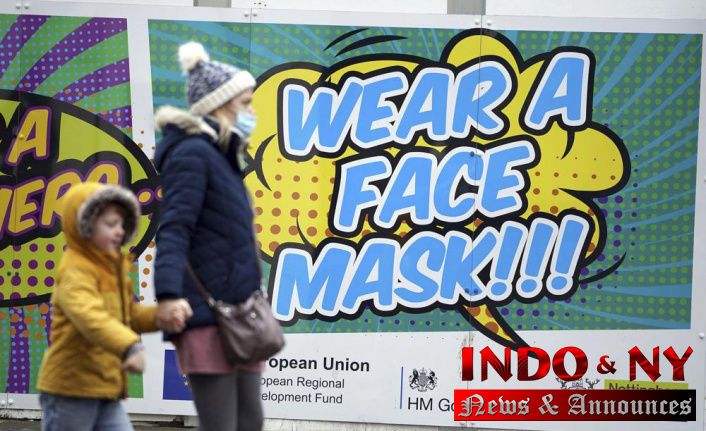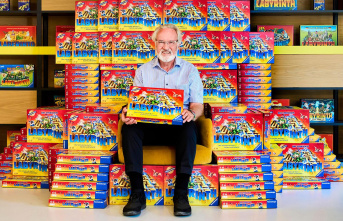This warning reveals the unpleasant choice Boris Johnson has to make: cancel holiday plans for millions of people for the second year in a row, or face a possible tidal wave and disruption.
European and American governments are facing similar problems over how to deal with omicron. It appears to be more transmissible than previous delta variants that caused surges in many areas of the globe. Although scientists warn it is too early to know, there are some preliminary indications that omicron could also cause less severe illness. However, it may be easier to evade vaccine protection.
Even though it's milder, this new variant could still cause havoc in health systems due to the sheer volume of infections. In the U.K., coronavirus cases have increased by 50% in just a week since omicron overtook Delta as the dominant variant.
Patricia Marquis, England director of the Royal College of Nursing union said that the future situation looks "very grim" as growing sickness absences and self-isolation hit hospitals trying to clear backlogs of postponed procedure and treat normal winter sickles alongside coronavirus cases.
She explained to the BBC that many people are already suffering from extreme stress and pressure. "So, they are beginning to get sick with COVID, as well as mental exhaustion, in some places." "So, staff now look forward and wonder, 'Oh my god, what's coming?'
The British Medical Association warned that nearly 50,000 nurses, doctors and other staff of the National Health Service in England could become sick from COVID-19 by Christmas Day unless further restrictions are implemented.
Many political leaders hesitate to impose the same stiff measures that they used earlier in the pandemic. This is often because they promised their citizens that vaccines would provide a way out of these restrictions, and it might be politically unfeasible to impose them again.
The prospect of the U.S. experiencing a cold winter due to a wave coronavirus infection is a stark contrast to the optimism expressed by President Joe Biden 10 months ago when he predicted that the country would be back to normal by Christmas. France is trying desperately to avoid a new lockdown, which would harm the economy and cloud President Emmanuel Macron’s re-election campaign.
Johnson of Britain, whose authority is being eroded by weeks of political scandals and calls for new limits to social interaction, is caught between the demands of scientific advisors and the vociferous opposition from his Conservative Party to any such restrictions.
Johnson's government had earlier this month reinstated the requirement for face masks in shops. It also ordered that people show proof of vaccination before they can enter nightclubs or other crowded places.
According to data, the government hopes vaccine boosters will provide more protection against omicron. It has set a goal to offer everyone aged 18 and over an additional shot by December 31. On Sunday, more than 900,000.000 booster shots were given. In addition, soccer stadiums, shopping centers, and cathedrals were transformed into temporary inoculation stations.
However, scientists agree that more drastic action is necessary.
Dominic Raab, the U.K.'s Deputy Prime Minister, stated Monday that he couldn't "make hard and quick guarantees" that no new restrictions would be announced this week.
Ministers from the government are discussing a variety of options. These include non-binding guidance to people on how to limit festive gatherings, to social distancing and curfews at bars and restaurants.
Omicron's rapid spread in the U.K. is decimating the economy during the busy pre-Christmas period.
Cancellations are often a problem for bustling restaurants and theaters. Because so many of their staff are sick or isolated, some restaurants and pubs will close until after the holidays. One of London's most popular attractions, the Natural History Museum, announced Monday that it would be closing for one week due to "front-of house staff shortages."
Hospitality industry has urged the government to provide financial support as it did during the pandemic, when many businesses had to close or be severely curtailed. After Britain lifted restrictions this summer, the government ended all of the programs, including loans, grants, and a program that paid millions of furloughed workers' salaries.
Others are watching closely the U.K. as it reported on Sunday 82,886 additional lab-confirmed cases of COVID-19 in a single day. This is close to a record.
On Sunday, the Dutch government initiated a nationwide lockdown to combat rising infections. Other European countries, however, have chosen to do less.
France and Germany have banned most British tourists from entering. The Paris government has also banned public fireworks displays and concerts at New Year's Eve celebrations. Ireland has imposed a curfew of 8 p.m. on bars and restricted attendance at outdoor and indoor events.
The national average number of new cases in Spain is now double the level it was last year. Authorities in Spain, which has one of the highest vaccination rates in Europe, are focusing on mandatory mask-wear indoors and the introduction of booster shots without any further restrictions.
Miguel Hernan, an Harvard University epidemiologist who advised the Spanish government in the pandemic earlier, stated that while it was understandable for the Spanish government to resist imposing new restrictions, he cautioned that it was better to act quickly than later.
He said, "The sooner they are applied the shorter their time is needed."
German Health Minister Karl Lauterbach stated Sunday that there will not be a lockdown prior to Christmas, but warned: "We'll have a fifth wave."
Hendrik Wuest (North Rhine-Westphalia governor, Germany's most populous country), said that more restrictions could be in the near future.
He said, "I don’t believe big New Year parties could happen this year -- unfortunately again." "Omicron won’t forgive us for being careless if we aren’t careful."












